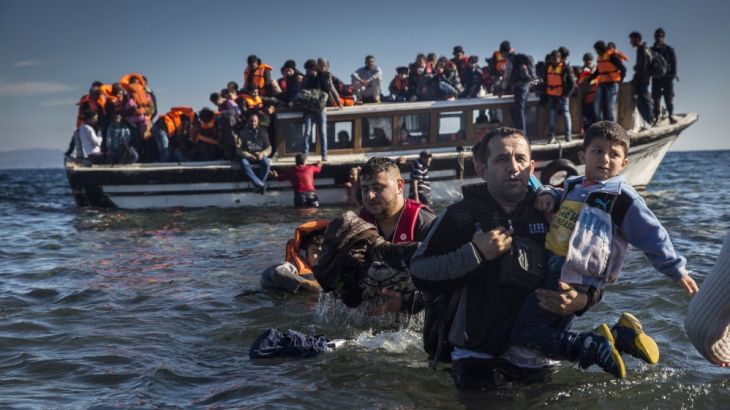UN says over 700,000 refugees reached Europe this year
Report says children made up 20 percent of the total arrivals, and more than 3,000 have either died or gone missing.

More than 700,000 people have reached Europe’s Mediterranean shores so far this year, amid the continent’s worst refugee crisis since World War II, the UN refugee agency has said.
About 562,355 people fleeing war and upheaval – mainly in Syria, Iraq and Afghanistan – reached Greece’s shores, while some 140,000 arrived in Italy this year, according to the report released on Tuesday.
Keep reading
list of 4 itemsDoes Israel’s Netanyahu have a plan for a ‘day after’ the war on Gaza?
Why Egypt backed South Africa’s genocide case against Israel in the ICJ
US sanctions two RSF commanders as fighting escalates in Sudan’s Darfur
In the whole of 2014 the number of people arriving was 219,000.
Children made up 20 percent of the total arrivals this year, the UN High Commissioner for Refugees (UNHCR) said.
More than half of this year’s arrivals were from Syria, 18 percent from Afghanistan, and six percent from Iraq.
A total of 3,210 refugees have either died or gone missing as they made the journey.
About 85 percent of the refugees were from what the UNHCR described as the world’s 10 main refugee-producing countries.
European leaders commit to more shelter for refugees
As Europe struggles to deal with the crisis, the flow shows no sign of abating despite worsening weather conditions, according to the International Organization for Migration (IOM), which reported the arrival of 5,239 people in Greece on Saturday and 4,199 on Sunday.
“Because of the bad weather and rough seas, IOM staff report that tracking migrant boats at sea is becoming more difficult and more aerial surveillance is being implemented,” the IOM said in a statement on Tuesday.
‘Tectonic changes’
EU Commission President Jean-Claude Juncker said on Tuesday that an uncontrolled flow of refugees needs to be slowed down.
This means registering people when they enter EU and informing the refugees of existing rules and consequences if they refuse to get registered, he said.
“The crisis, or rather, challenge, that we, all of us as a community of the European Union, are facing now is perhaps the biggest challenge we have seen for decades,” he said.
|
|
He warned that the situation “has the potential even to destroy achievements” in the EU, including the border-free travel between Schengen countries.
“What is even more dangerous, it has the potential to create tectonic changes in the European political landscape,” said Juncker.
“And these are not changes for the better.”
The handling of the flow of refugees has been igniting tensions among EU member states.
Bavaria’s state premier blasted Austria for waving on thousands of refugees to Germany without informing local authorities and called on Chancellor Angela Merkel to intervene.
“Austria’s behaviour is hurting our neighbourly relations. We cannot and should not deal with each other this way,” Horst Seehofer told the Passauer Neue Presse in an interview.
Seehofer’s region, which borders Austria, has been the main gateway for hundreds of thousands of asylum seekers arriving in Germany in recent months.
They complain that the lack of coordination is leaving them scrambling at the last minute to find resources to welcome the new arrivals.
Late on Monday, for instance, about 2,000 refugees crossed on foot into Bavaria, catching local authorities unaware, police said.
In Croatia, authorities said an estimated 260,000 have passed through the region since Hungary closed its borders in mid-September, while Slovenia continues to face tens of thousands of new arrivals.
But, as Al Jazeera’s Robin Forestier-Walker reports from the Slovenia-Croatia border, volunteer aid workers said they are being prevented from offering much-needed help to refugees.
“The police seem to be doing a very good job with crowd control, but the humanitarian effort, from what we have seen, isn’t quite as adequate,” he said.
An estimated 15,000 refugees go through the border every day.